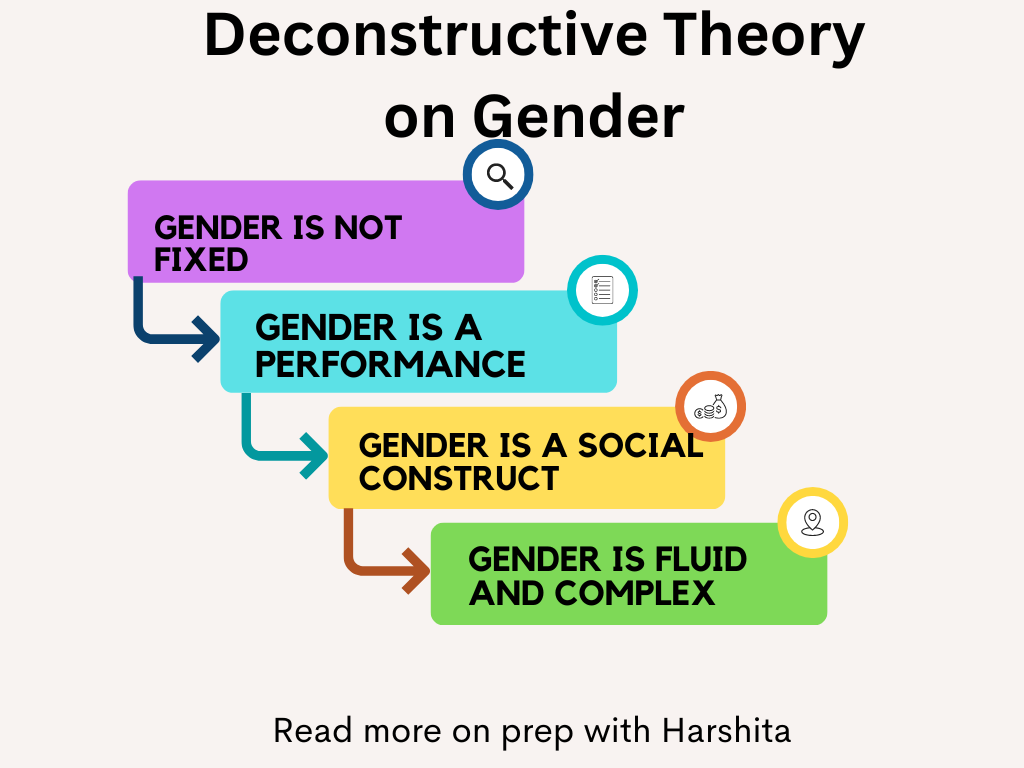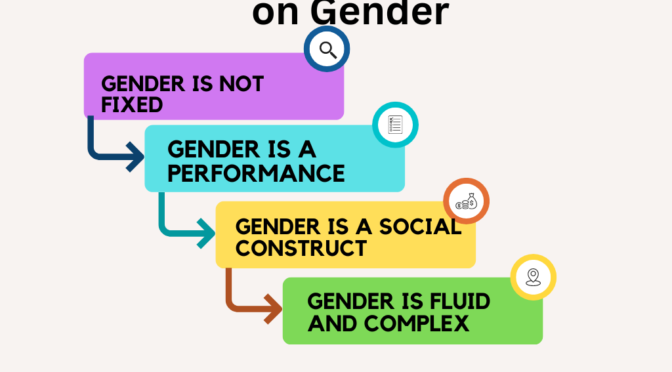Deconstructive theory on gender is a theoretical framework that aims to question and challenge the binary understanding of gender, which posits that there are only two distinct and fixed gender categories: male and female.
- This theory seeks to deconstruct and challenge the traditional assumptions and meanings associated with gender, including the social, cultural, and political constructs that shape gender identity.
- Deconstructive theory on gender is rooted in postmodernism and draws from the work of French philosopher Jacques Derrida, who proposed that language is not fixed and stable but rather is a constantly shifting and evolving system of signs and symbols. According to deconstructive theory on gender, gender is a social construct that is not fixed or stable but rather is a product of discourse and cultural practices.
- Deconstructive theory on gender challenges the idea that gender is determined by biological sex, and instead suggests that gender is a performance or a social role that is constructed through social interactions and language.
- This theory argues that gender is not a natural or innate category but rather is a social construct that is created and maintained through cultural practices, norms, and power dynamics.
Features of Deconstructive Theory:
- Gender is not a fixed or stable category: According to deconstructive theory on gender, gender is not an inherent or stable characteristic of individuals. Rather, gender is a social construct that is created and maintained through cultural practices, norms, and power dynamics.
- Gender is a performance: Gender is not something that individuals possess, but rather something that they do. Deconstructive theory on gender suggests that individuals perform gender through their behavior, appearance, and language.
- Gender is shaped by cultural practices: The meanings and expectations associated with gender are shaped by cultural practices, norms, and power dynamics. Gender is not a natural or innate category but rather a product of discourse and cultural practices.
- Gender is a social construct: Deconstructive theory on gender challenges the idea that gender is determined by biological sex, and instead suggests that gender is a social construct that is created and maintained through cultural practices and power dynamics.
- Gender is fluid and complex: Gender identity is not fixed or binary but rather is fluid and complex. Deconstructive theory on gender recognizes that individuals may not fit into traditional gender categories and may experience their gender identity in different ways.
- Gender is political: Gender is not just a personal characteristic, but also has political and social implications. It recognizes that gender identity is intertwined with power dynamics and social inequalities.
- Gender can be deconstructed: It provides a framework for challenging traditional gender roles and expectations. By deconstructing the meanings and assumptions associated with gender, individuals can create new understandings and practices around gender identity.
Deconstructive Theory Application in Indian Context :
Deconstructive theory on gender has been applied in the Indian context to challenge traditional gender roles and expectations and to promote gender equity and social justice. Here are some examples of how this theory on gender has been applied in the Indian context:
- Critique of binary gender norms: In India, traditional gender roles and expectations are deeply ingrained in social and cultural practices. Deconstructive theory on gender has been used to challenge the binary understanding of gender and to promote alternative understandings of gender identity that go beyond male-female binaries.
- Transgender rights and activism: India has a vibrant transgender community that has been advocating for their rights and recognition. It has been used to promote the recognition of non-binary gender identities and to challenge the social stigma and discrimination faced by transgender individuals.
- Feminist and queer activism: It has been influential in feminist and queer activism in India. This theory has been used to challenge patriarchal norms and expectations, and to promote gender equity and social justice.
- Education and curriculum development: Deconstructive theory on gender has been used to develop educational curricula that challenge traditional gender roles and promote gender equity. This approach has been used in schools and universities in India to promote critical thinking and to challenge gender stereotypes.
- Legal reform: This has been influential in legal reform in India. This theory has been used to challenge discriminatory laws and policies that are based on binary understandings of gender and to promote the recognition of non-binary gender identities.
Also Read : Socialization Theory

Also Visit : Prep with Harshita


bmt3dh